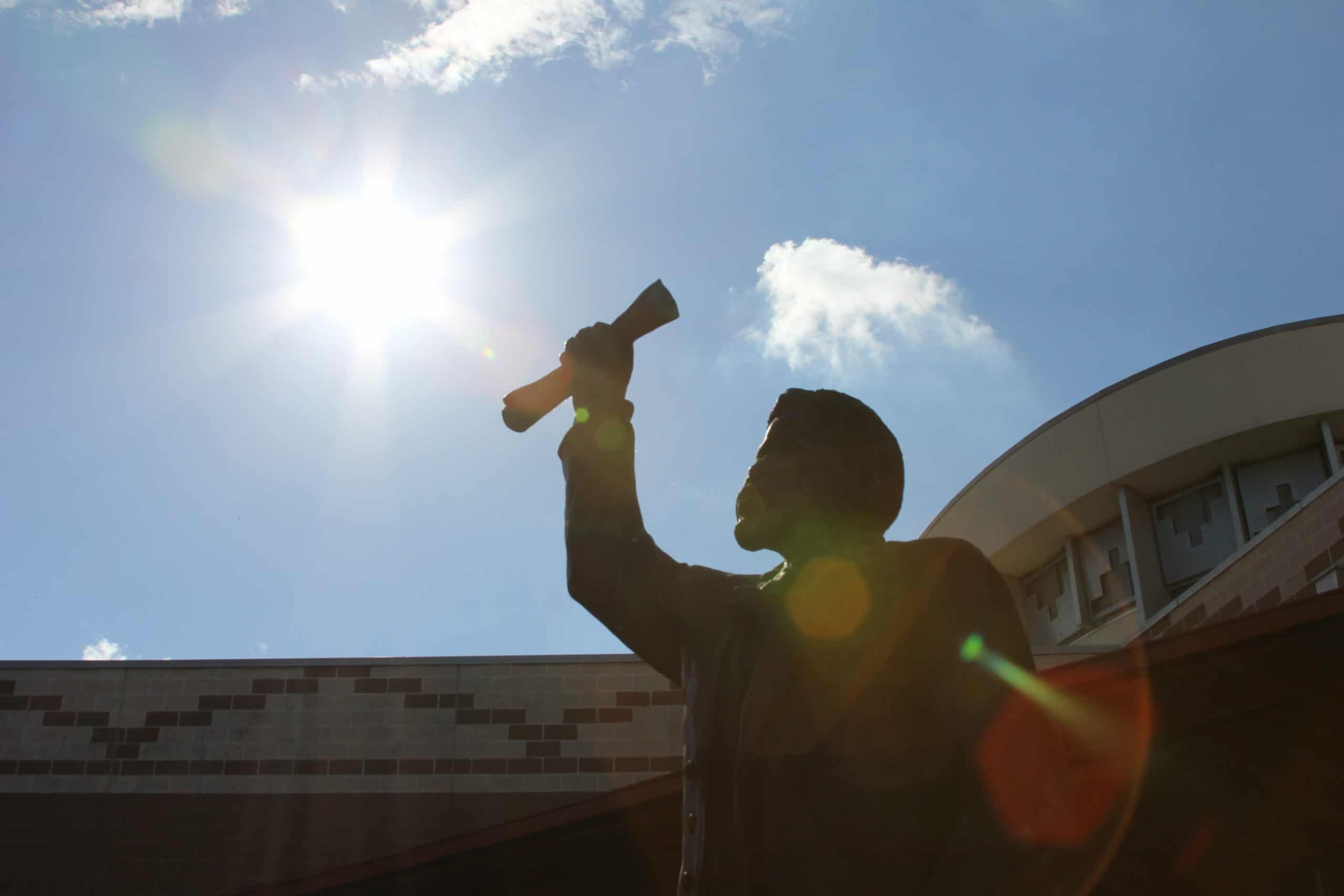Juneteenth is our time. I am seeing a ray of sunshine that is beaming down not only in the Black community but in the whole of America. I truly believe that, with the trauma of COVID-19, the death of George Floyd and the subsequent protest, America will become a better place due to the lessons learned from these events. As we are celebrating today, June 19th, Juneteenth, this holiday will be a celebration for hope and the concretization of justice. We will sing together: “Lift Every Voice and Sing.”
This deep sense of hope that I feel helps me to remember that America belongs to all of us. We are called to make it a livable home with equality, equity, and justice for all. In her speech in St. Louis, on February 3rd, 1952, Josephine Baker said, “My people have a country of their own to go to if they choose… Africa… but, this America belongs to them just as much as it does to any of the white race… in some ways even more so, because they believe in hope.”
Black people in America know how to pray and work for hope. Even if it is not here, we will always fight for it. As Coretta King, the wife of Dr. King would say, “Struggle is a never ending process. [Hope] is never really won, you earn it and win it in every generation.” This is what happened on June 19th, 1865.
June 19th As Black People’s Independence Day in America
155 years ago today, U.S. General Gordon Granger read a declaration of freedom for the Black slaves in Galveston, Texas. The proclamation stated: “The people of Texas are informed that, in accordance with a proclamation from the Executive of the United States, all slaves are free.” Even though President Abraham Lincoln had ended slavery in Confederate states two years earlier with the Emancipation Proclamation, promulgation and enforcement had not reached Texas yet, where many slaveholders had brought their enslaved people to avoid the war.
As one of the oldest holidays celebrated in the Black community, June 19th remains also as a celebration of the history of Black people in America. The earliest commemorations date back to 1866, one year after the event. In that year, at a party with her parents, a little African American girl could not pronounce June 19th and said “Juneteenth,” which is how the celebration widely became known.
The spirit of this celebration plays like a memorial symphony recalling the movements of history in the black community. As James Baldwin said:
History, as nearly no one seems to know, is not merely something to be read. And it does not refer merely, or even principally, to the past. On the contrary, the great force of history comes from the fact that we carry it within us, are unconsciously controlled by it in many ways, and history is literally present in all that we do. It could scarcely be otherwise, since it is to history that we owe our frames of reference, our identities, and our aspirations.
From Juneteenth to the Civil Rights Act of 1964 to President Obama’s affirmation “Yes We Can,” we continue to rally and remain motivated that change will come. The sense of hope that is maintained in the Black community is born from the resilience of suffering, injustice, centuries of inequalities and repression, yet, we never fail.
Hope motivated us to fight for justice, run from inequality. As Frederick Douglas put it, “I prayed for freedom for twenty years, but received no answer until I prayed with my legs.” For the Black community, movement is necessary to make a difference and create a path to the future.
In light of all that is going on in the country, we need to celebrate and come together as a community. Juneteenth this year should also be looked at as a way to celebrate freedom from the modern day systems of enslavement and systemic oppression, even if this freedom is not yet fully realized.
As a Black man in America, I see hope as the biggest weapon that I can use to fight against systemic racism. When I wake to go jogging, go to the store, drive to school, hope is the only faith that helps me make it through. I have to hope that I will make it back home each day. As a Black body, hope gives me resilience to continue despite every dehumanizing structure oppressing and suffocating me.
Hope Is Black People’s Home
Even after the 400 years of desperation, oppression, and repression, Black people always find hope. Their presence in the street for more than three weeks has been a quest for hope. We believe that something good can always come from adversity.
We are mourning the death of Rayshard Brooks who was killed by police on June 12, in Atlanta, GA. We are still remembering the death of George Floyd on May 25 who was killed at the hands of police due to a lack of oxygen. The stories of many others in America still break our hearts. But we are also celebrating our freedom as a spring of hope today in America.
In the Black community, one is always able to see a ray of hope, even in the midst of today’s despair, racial injustice, and systemic racism that have become clearer in this last decade. With the epidemic of the virus of racial injustice, hope remains as the only vaccine that can cure these illnesses. We are soldiers of hope.
A Gallup poll from 2017 showed that the Black community had the lowest average life satisfaction compared to whites, Asians, and Hispanics, but we also had the highest anticipated life satisfaction. We can do it.
Now is a moment of Kairos, divine timing for us to live with the audacity of hope in the midst of the chaos. This is a time that calls us to enter into a meditative conversation with themselves and uncover the unconscious biases that keep us from moving to a place of spiritual conversion, a metanoia.
The question is: Who do ‘we’ want to be for each other?
Today, we are living in an aspirational ‘we’ as the project of America, striving to be united together. It may be tempting to run away from it. It is hard, but it is necessary. Sometimes we forget how new this journey is for us as humans, living in unity as a people of hope.
Today, Juneteenth is more than a date. It is a place of hope for the Black community. It is our new Civil Rights Act of 2020. Our new Declaration of Independence in 2020.
Juneteenth is like the resurrection. It is a promise, a celebration of “Freedom,” an aspiration of “I have a Dream,” a cry of “Yes We Can,” but also a plea of “I can’t Breathe” and a lamentation of “Black Lives Matter.”
As James Baldwin eloquently said on June 19, 1986, “I really do believe that we all become better than we are. I know we can. But when?” Now is the time to ask oneself, Who do I want to become, and how do I want to be remembered in history? Juneteenth is our time.


